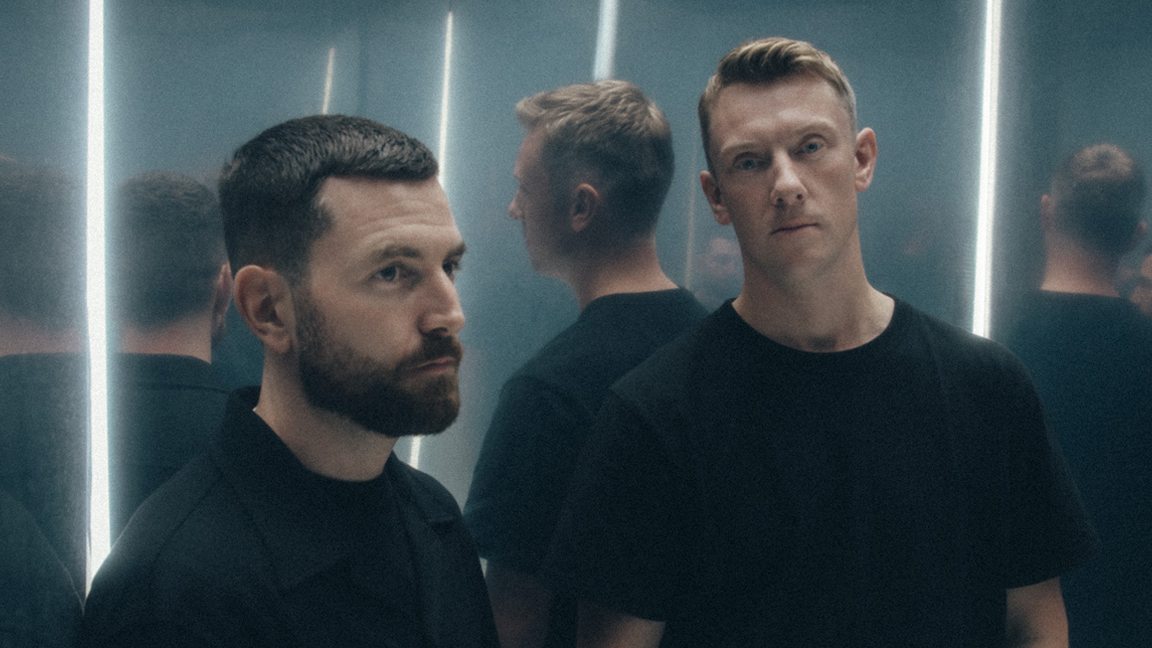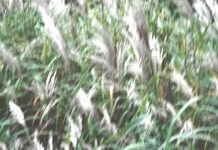Matt McBriar (left) and Andy Ferguson (right) are Bicep (Foto: Dan Medhurst)
In 2017, Bicep released their self-titled debut album turning them into one of the most successful acts in the scene. In contrast to their early, house-heavy productions they created a unique breakbeat-leaning sound, which, much like the music of Traumprinz or Burial, was driven by a nostalgia for the 1990s, the mythical decade of club music defining everything which Bicep, born around 1990, were not able to experience by themselves.
In addition to this special emotional quality of their music, Bicep’s success also draws from their ability to produce songs that develop the storytelling required for home listening as well as the energy needed on the dance floor. GROOVE’s readers celebrated this versatility awarding Bicep as album and „Glue” as track of the year in the annual reader’s poll of 2017. No act had managed this kind of success before. Extended touring around the globe ensued with sold out shows and live broadcasts online. As one of the very few electronic acts of their generation, Bicep stage concerts beyond clubs and festivals without accompanying DJ support.
Andy Ferguson and Matt McBriar from Belfast in Northern Ireland started out with a music blog. Feelmybicep developed into an seminal source for both leftfield and colorful house and disco, often feeding off forgotten lines in the history of club music. The big breakthrough was still some time away. Even though they had a number of powerful hits like „Vision of Love” or their edit of Dominica’s „Gotta Let You Go”, long DJ sets in half-empty clubs are also part of Bicep’s history. Now, a couple of years later, their second album, Isles, lands.
GROOVE writer Jan Goldmann spoke to Ferguson and McBriar via Zoom. During the chat, the two explained how they came across Bulgarian women’s choirs sampled in their current single „Apricots”, why they miss the crowd at their online gigs, the interplay of their native home of Northern Ireland and their adopted home of London in their music – and why it is important to sometimes play around like little children.
About three and a half years have passed since the release of your debut LP. How did you know that it’s time for a second album?
Matt: There was no contract. (laughter)
Andy: We finished the last tour and two weeks later we started working on the next album. That was pretty much it. We didn’t really do any writing while we were on tour. From 2017 to 2019 it was mostly just organizing the live show. But then in January [2019] we were just ready to start writing again.
Matt: And instead of doing a few EPs we definitely wanted to release another album. We had lots of ideas and sometimes when you just do one EP after another it becomes less structured.
Andy: Writing an album is a lot more fun to us.
You said the tracks in the album are capturings of moments, „a version for listening at home“. What do you mean exactly? Are the tracks on the album softer than their respective versions you would perform live in a club or at a festival?
Andy: Essentially, yes. We wanted to really explore what we could do sonically. Home listening is definitely a different approach to music. It needs to be a lot more dynamic whereas in a club you go for a quite concrete dance floor orientated direction. We made the decision early on to focus on the softer elements, to really progress them musically and then revisit the more techno-ey harder stuff for when we do the live show.
Matt: Having in mind that we might be touring this year we want to be able perform different versions rather than just one version over and over again.
The release of your debut album was followed by an intense tour with live performances in clubs and at festivals. You also played concerts beyond the dance circuit. Right now we are stuck in a moment where all of this is just not possible. Last year you presented live shows online via stream. How did that work out for you? Is this also an option for a future closer to the old normal?
Andy: We are doing another one in February and we will do one more but it wouldn’t be our preference. I think one cool thing with the live streams was getting a chance to involve ourselves with the visuals. That’s not something we usually would do, it’s like a home DVD or something. It’s cool that we actually have that recording done, but it definitely doesn’t have the same energy as a live performance. The show, the lighting and the spectacle is such a big part of live music and we don’t think it comes across the same way. People would have to have big sound systems, big screens. It’s very hard for everybody to enjoy it the same way.
Matt: As musicians as well it’s quite hard to rewrite a show and keep it fresh every time. We will perform it differently every time but it requires a lot of work and a lot of stuff behind the scenes. It costs a lot of money. Boiler Room for example provides in its shows the whole equipment, the filming and the production. But when you start doing it yourself you need to get your own film crews. The filming days were crazy. Also all the planning with the cover and stuff was a monumental task. You forget what it was like just turning up in a club playing records. It seems so much like simpler times. (laughter)
„You can hear the crowd screaming“
And the missing crowd?
Andy: We definitely really miss the interaction with the crowd, that’s just so important for dance music and live music in general. They give you so much energy, it doesn’t feel the same when you are in a quiet room.
Matt: I think it’s the in between part that gets lost. When we’re in between songs we would usually jam or bounce off the energy for some time that you can break it down to almost silence. You can hear the crowd screaming. Something that’s impossible in a room all by yourselves. It just feels a bit weird. (laughter) It’s moments like that when you really miss the crowd. You’re kinda waiting for them to cheer you back in. That makes live shows what they are. We did discuss to do some kind of interactive live show where we are playing and there is a computer screen in front of us and people type in messages to us. Or to give them options like should we play harder, should we play faster and people vote live whilst we are doing mixes. We don’t think the technology is there yet, but it’s something that we think about doing in the future possibly.
Let’s stick to Covid for a moment: You’ve been working on the new album for about two years now, meaning almost half of it was created during those uncertain times. How did this influence the new album? Or did it turn out to be a different album than you initially planned on doing?
Andy: We actually finished the album before Covid. We mixed it down afterwards but the actual writing was finished by March. We actually meant to be starting our live tour the weekend of the first lockdown, so it hasn’t really affected our writing, which has been kind of good. It would’ve been really hard to write an album in the middle of this year. Maybe now is a good time to write because there is optimism that clubs might open again. When Covid hit for the first time, careers were ending, no more gigs were happening. Nobody planned for something so hard and we think it would’ve been really hard to finish the album.
To produce the tracks you used a wide range of unusual elements. In the lead single „Apricots“ you sampled traditional Malawian folk songs and in another you used a Bulgarian women’s choir broadcasted by the federal network of Bulgaria. Where do you look for this kind of samples? And how do you make them fit into the classic Bicep sound?
Matt: It’s a lot of trial there in terms of getting it to work. We have many field attempts and we only let people hear the good ones. (laughter) We dig for music of all kinds, we are always curious about everything, especially in the past five to ten years. London is such a huge multicultural hub.
Andy: There are a lot of cool record stores that we regularly go to. Like one that closed down called the Lucky 7. It got a crazy amount of music from around the world, it was really cool to just run through there. For us it’s fun to dig for rare stuff and hit more unusual stores rather than the classic pretty standard dance music stores. We always try to spread ourselves as wide as possible. We even go to sound libraries and archives. Also the internet is really amazing for searching for music.
It’s about collecting all kinds of sounds that seem interesting and finding those two to three percent that would work out to become part of your music?
Matt: Exactly. Sometimes we buy tons of library CDs, something that people would use as background music for a biology DVD. We sample just anything we find, weird little speeches or documentaries. Everything that seems interesting and offers the question if you can manipulate that into your own sound. On this album we definitely would start off with a lot of samplers. We got a big stack of samplers. (laughter)
Andy: We got these kid toys (holding kid toy sampler in the camera). You just sing into here (showing a little built in microphone) and it maps your voice for the whole keyboard. (laughter) We’re always playing around and sampling stuff into that and just try to be messing it up and see what that does.
„Just rely on your own ears“
A very exploring and intuitive way of producing.
Andy: We got no rules. Just rely on your own ears.
Matt: We definitely recorded quite a lot for this album. Every single day we set ourselves the challenge to listen back to everything we recorded and record new stuff. This is why we ended up with around 150 demos. A lot of them sound shit (laughter) but it’s good to have a reference point. Because when we go back and we listen to the demos or tracks that made the album, it’s quite amazing to see the process. Where they went and what different directions we took in them.
150 demos? The new album has ten tracks on it. How do you determine what’s good enough to make it to the album?
Andy: It’s really hard but it somehow just happens. It’s not to discount the music that doesn’t make the album, they might become B-sides or we can play them in the live show. It’s more like curating the blog or picking records for a mix, you just sort in what fits. You feel it.
Matt: Sometimes tracks are either too similar or they’re just not right because they don’t fit well together. When you line all the tracks together they just should suit nicely. We did a lot of hip hop beats or trappy demos and none of them even made it. But at the same time now we got a folder, so if we ever want to make an album with slow broken hip hop stuff we got the material. We wanted to try everything.
Andy: It’s important to keep your mind fresh.
Matt: Everyday we try to change the tempo, one day it’s 160, the next day 80, very rarely we say 120, 130. It just happens.

The title Isles is linked to your past of growing up on the island of Northern Ireland. The album processes emotions and experiences growing up there. Can you explain how you translate these memories into sounds, melodies, beats and finally – tracks?
Andy: You have to write the music. And when you hear back what you’ve written, only then you draw the parallels to the stuff you heard when you were younger. The music that we got subjected to in Ireland is very different to the sounds you get in London. But very much when we look at our sound we can see influences from both Ireland and London. In Ireland there is a lot of trance and synthy stuff, very melodic. London is a lot deeper, more jungle, more garage, more world sounds. And then we kind of combine both together. We can see the influences that we picked up on. But with instrumental dance music it’s very hard to pinpoint a lot of things. We just spend a lot of time recording. There is also the advantage of being two people. One day one of us is in a good mood and the other one is in a bad mood. You get this strange mixture, that’s super interesting.
You used to channel a classic house sound in your tracks resembling the music you were hosting, sharing and collecting on your blog feelmybicep. Your debut album consists of breakbeat hymns and pop-driven melodies though. Did you intentionally change your style from let’s say „Circles“ to „Glue“?
Andy: I think the truth is, all our early music was aimed completely at clubs. So we hadn’t really unlocked truly to being able to write stuff that was more emotional. To write stuff that was more storytelling. We used to write tracks that were supposed to work in a club. It was only when we started writing an album we started writing music for listening purposes and not for the dancefloor only. And that’s where there was a change. We no longer thought „Oh, but can you mix this?“ And then obviously we had to think how we would do the live show which was then trying to re-interpret what we’ve written for clubs again. That’s something we kind of build on now. With this album we really aimed at home listening with the idea that in the future we can play it in a club and we will make it different then, we will make it work.
As we talked about before, you were touring heavily over the course of the last few years. Your live sets often create a concert-like atmosphere, even doing an encore or some kind of curtain call, if you will, at their end. How does it feel to evolve into a successful headliner from originally creating a blog to share some music and doing some edits?
„At our first live show nobody danced to ‚Glue‘, nobody cared“
Matt: Yeah, it is kind of mad. In the beginning, we did around five years of touring in really small venues, like 200 capacity clubs. And those were half empty. We were going through a time of long DJ-sets for few people. We also made a lot of mistakes with the live show. At our first live show nobody danced to „Glue“, nobody cared. The first time we played it people were just like „Ugh so what“. It’s nothing that happened overnight. It was built slowly, very very slowly. It’s always easy to remember the good bits but we definitely had plenty of bad ones as well which is all part of the process.
After releasing an enormously well received debut LP, did you feel pressure having to do an equally successful sophomore album?
Matt: We initially kind of thought that we wouldn’t. We thought the first album was the second album because we released so many EPs. And that the album is just gonna be something like a longer format EP. When we realized the whole album process turned out to be two years we realized we need to have stuff to sustain the live show. So we definitely felt the pressure from an early point. But we didn’t have the pressure do redo things. We didn’t go back, listened to the old stuff and tried to imitate the techniques we used. Or reuse the same vocal again. Just the pressure about hoping to do well.
Andy: Writing an album is a big process. We wrote so many demos, at some point it’s just tiring. We originally aimed to finish Isles in nine months. After nine months we were nowhere near ready, so we took more time. The second album is definitely the hardest. For the third one we can go weird and no one will care, but the second one is definitely very hard. You have to prove something, you have to fulfill expectations. We are pretty happy with where we got to.
Matt: We definitely showed the ideas that we wanted to be shown in the right way. What we really want is when people experience the live show to hear those versions that they heard on the album and really enjoy the live version even better. It makes the live show even more special, because you can’t really get those versions anywhere, it’s only in this moment.
Talking about live shows: It is still uncertain when physical events will happen again. Are you having any plans for the summer or do you just keep your schedule open?
Andy: No, no. We have lots of stuff penciled in, but whether it happens or not we don’t know. At the moment there is nothing. It’s just super up in the air. For our mental health, we just relax and it comes when it comes. We’re not stressing it too much. In many respects we are really lucky that we have already done one album and one big tour. It would now be very tense if it was our first album, where we would be always working on and then someday, it collapses. We kind of feel more comfortable now, we’ve done a tour and we should be able to pick up when things do.
Matt: We’ve been listening to our new music for a year, we’re not yet bored of it. That looks like a good premise for the future.





